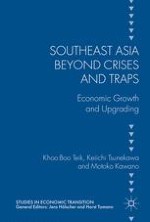
2017 | OriginalPaper | Buchkapitel
1. Southeast Asia: Beyond Crises and Traps
verfasst von : Boo Teik Khoo, Keiichi Tsunekawa
Erschienen in: Southeast Asia beyond Crises and Traps
Aktivieren Sie unsere intelligente Suche, um passende Fachinhalte oder Patente zu finden.
Wählen Sie Textabschnitte aus um mit Künstlicher Intelligenz passenden Patente zu finden. powered by
Markieren Sie Textabschnitte, um KI-gestützt weitere passende Inhalte zu finden. powered by